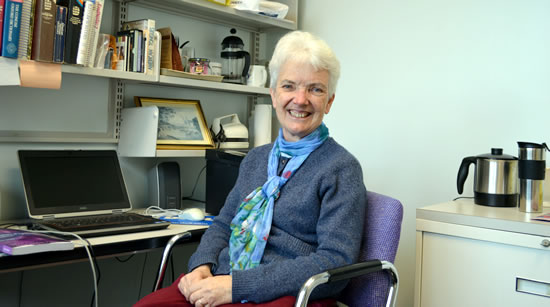Hunter College Professor Garners Outstanding Alumna Award From Teachers College
By Annie Nova

Dr. Kate Parry
An individual’s vocabulary bank is like the chips they have in the game of life. As a teacher of English as a second language, Kate Parry raises her students’ chances of winning.
Last month she won an outstanding alumna award from Teachers College for her powerful contributions to education. Born in Cambridge in the 1950s, she was only two years old when her father took a job as the dean of a school in the West Indies to escape a hostile post-World War II environment. She would spend her formative years in Jamaica and then at nine her family would move again, this time, to Nigeria.
She would go on to study history at the University of Cambridge. “When I finished at Cambridge it was only natural to think about working in Africa,” said Parry.
She started at a program called Teachers for East Africa, a fully funded yearlong education that would qualify her to teach in Britain, as long as after she taught in East Africa for two years. She would end up spending a lot more than two years there.
“They called it aid to Africa but it was actually aid to us,” joked Parry.
In fact she would teach children in Southwest Uganda for almost five years. On average she had a hundred and twenty students at a time; at one point she had two hundred and forty.
Parry was disturbed by the way the education system scrubbed away the unique backgrounds of its students.
“They were being encouraged to be someone else.”
Parry made it her mission to understand these students in their own context. She researched and ended up writing her dissertation on why so many students were failing their exams in Northern Nigeria.
She discovered and would argue that the tests were too black and white; they did not distinguish between people who can work with the text and those who didn’t understand it at all.
Students who were drawing richly upon their contextual knowledge were doing poorly on the exams. It was not a language barrier as much as it was a cultural one. Their theory of the world clashed with that of the test makers.
Parry argues that teachers should make it a priority to understand why students are producing certain answers. If students are responding intelligently to the readings but receiving failing grades, it is the system at blame.
It wasn’t long before her students were getting As on their exams. She assigned weekly essays and fed them books that were engaging and relevant.
Then Parry moved back to Britain to teach English to immigrants living in impoverished conditions. She says she taught with a practical approach, serving students the English that they most needed at the time. If a student needed to learn how to communicate on the bus, that is the words she taught them.
“My class doubled in size and then tripled,” said Parry.
She then moved back to Nigeria to share her successful ways of educating with teachers there. The unpredictable water and even more unpredictable electricity didn’t stop her. After the third time her refrigerator exploded, she opted to live without one. “It was quite an exercise keeping one fed.”
When she was offered a scholarship at Teachers College, Parry moved to New York City. She has been teaching English at Hunter College for twenty-eight years now.
However, Parry’s work in Africa is far from complete. She promotes and fundraises for community libraries in Uganda. “They don’t take a lot of money to run,” said Parry. One of them operates under a tree. “When it rains you just pack up the books and run indoors,” said Parry.
With the help of her students at Hunter College, Parry is also working on a book called English Speakers: Stories of People and Language. #
